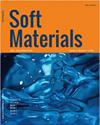Preparation and characterization of tissue plasminogen activator-loaded liposomes
IF 1.4
4区 材料科学
Q4 MATERIALS SCIENCE, MULTIDISCIPLINARY
引用次数: 0
Abstract
ABSTRACT Liposomes have drawn a lot of interest as pharmaceutical carriers for thrombolytic enzymes. Tissue plasminogen activator (tPA) is a thrombolytic drug used to treat cardiovascular disorders. Clinical efficacy of tPA is limited by its short half-life, hemorrhagic side effects and poor penetration into large blood clots. Using its liposomal form can reduce such effects and improve thrombolytic activity. The aim of this work is to study the effect of the composition of tPA-loaded liposomes on their physicochemical characteristics, such as size, zeta-potential, entrapment efficiency, proteolytic activity and in vitro release. It was found that prepared liposomes were relatively stable, no aggregation was observed during the storage at 4°C. Lipid compositions had a minor influence on the incorporation efficiency and a significant effect on the percentage of tPA released per time as well as its proteolytic activity. Developed liposomal form of tissue plasminogen activator can be used for treatment cardiovascular diseases due to its small size, stability, high entrapment efficiency and slow rate of drug release.组织型纤溶酶原激活剂脂质体的制备与表征
脂质体作为溶栓酶的药物载体引起了人们的广泛兴趣。组织纤溶酶原激活剂(tPA)是一种用于治疗心血管疾病的溶栓药物。tPA的临床疗效受到半衰期短、出血性副作用和对大血栓渗透性差的限制。使用其脂质体形式可以减少这种影响并提高溶栓活性。本工作的目的是研究tPA负载脂质体的组成对其物理化学特性的影响,如大小、ζ电位、包封效率、蛋白水解活性和体外释放。研究发现,制备的脂质体相对稳定,在4°C的储存过程中没有观察到聚集。脂质组合物对掺入效率有较小影响,对tPA每次释放的百分比及其蛋白水解活性有显著影响。开发的脂质体形式的组织纤溶酶原激活剂由于其体积小、稳定性好、包封效率高和药物释放速率慢,可用于治疗心血管疾病。
本文章由计算机程序翻译,如有差异,请以英文原文为准。
求助全文
约1分钟内获得全文
求助全文
来源期刊

Soft Materials
工程技术-材料科学:综合
CiteScore
2.90
自引率
0.00%
发文量
21
审稿时长
2.2 months
期刊介绍:
Providing a common forum for all soft matter scientists, Soft Materials covers theory, simulation, and experimental research in this rapidly expanding and interdisciplinary field. As soft materials are often at the heart of modern technologies, soft matter science has implications and applications in many areas ranging from biology to engineering.
Unlike many journals which focus primarily on individual classes of materials or particular applications, Soft Materials draw on all physical, chemical, materials science, and biological aspects of soft matter. Featured topics include polymers, biomacromolecules, colloids, membranes, Langmuir-Blodgett films, liquid crystals, granular matter, soft interfaces, complex fluids, surfactants, gels, nanomaterials, self-organization, supramolecular science, molecular recognition, soft glasses, amphiphiles, foams, and active matter.
Truly international in scope, Soft Materials contains original research, invited reviews, in-depth technical tutorials, and book reviews.
 求助内容:
求助内容: 应助结果提醒方式:
应助结果提醒方式:


